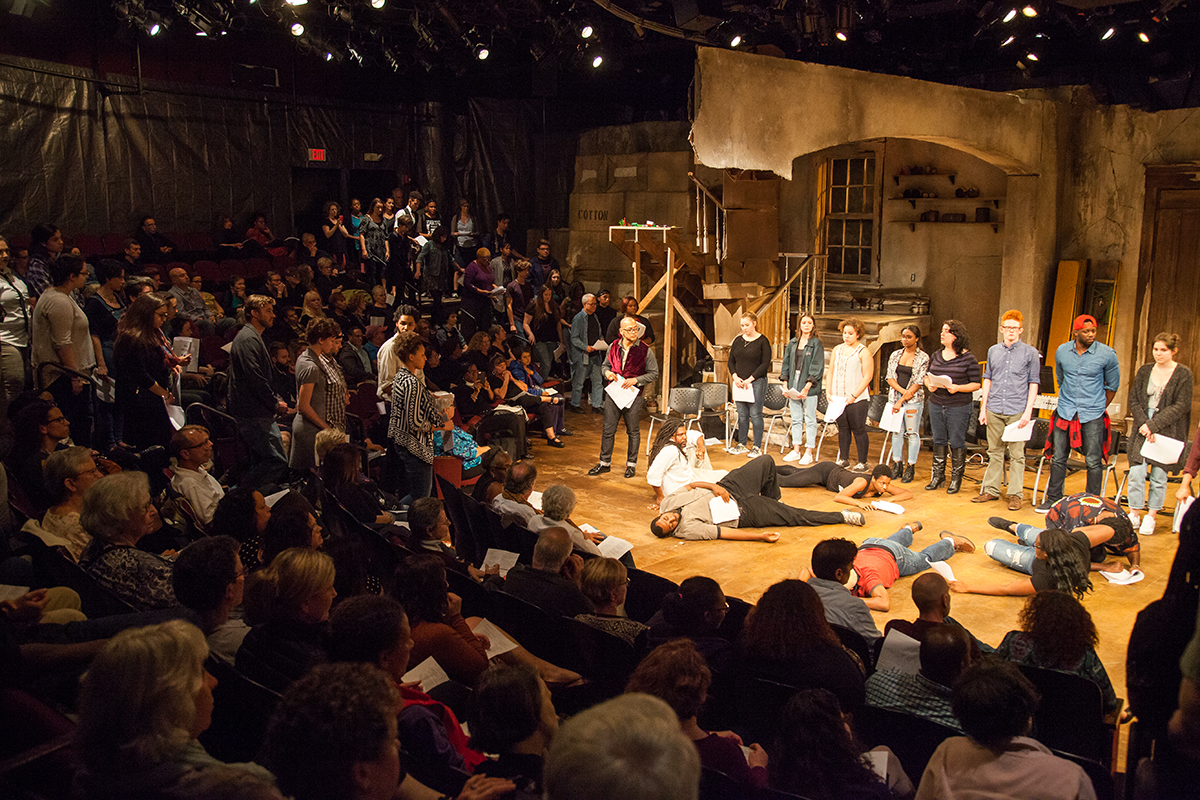Watch 80 One-Minute Plays at the Museum of Fine Arts

Every 28 Hours at Trinity Repertory Company, 2016. Photo by Erin X Smithers
In recent years, the claim that every 28 hours an unarmed black person is killed by law enforcement has spread across the Internet. While the reality is more complicated than that (the Washington Post dug into the ways this statistic was misinterpreted from a study), the sentiment behind it, and the growing awareness of the systemic racial injustices committed against people of color ensure that the phrase will stay in the popular lexicon for its substance, if not its pinpoint accuracy.
The claim is the namesake for the Every 28 Hours Plays, a nationwide collaboration of theater artists that formed following the killing of Michael Brown by police officer Darren Wilson and the city’s subsequent unrest.
Spearheaded by the Oregon Shakespeare Festival’s community producer Claudia Alick in collaboration with Dominic D’Andrea, producing artistic director and founder of the traveling theater company One-Minute Play Festival, Every 28 Hours is inspired by the Black Lives Matter movement. It responds to and explores an American landscape marred by racial inequality, addressing the question asked by its creators: “Every 28 hours, every 48, every 98—how many hours would it take for this not to be a national issue of vital importance?”
While it debuted in Ferguson and St. Louis, Every 28 Hours has now become a national performance movement made up of over 70 one-minute plays by 90 playwrights across the country, tackling issues such as police brutality, racial profiling, microaggressions, violence, and white guilt. Presented by Company One Theatre in collaboration with the Boston Arts Academy, Central Square Theater, Harvard Black Community and Student Theater Group, and the Theater Offensive, Every 28 Hours will open for a one-day-only performance at the Museum of Fine Arts’ Remis Auditorium this Saturday.
“We’re at the point in America right now that we already know that privilege exists [and] that systematic injustices happen every single day,” says Company One’s assistant to the artistic director Phaedra Scott, who took the role of lead artistic producer for Every 28 Hours. “Now we have to do the hard stuff, which is fixing it.”
Before moving to Boston a little over a year ago, Scott lived in Cleveland, Ohio on a street that happened to be the one on which 12-year-old Tamir Rice was shot and killed by police officer Timothy Loehmann in November 2014. “At the time I was working at a theater company there and there was no response,” Scott recalls. “I felt so isolated and alone being in what was a broken city after [Rice], but one where nobody said anything.”

Every 28 Hours at Trinity Repertory Company, 2016. Photos by Erin X Smithers
Every 28 Hours is split into nine sections with themes such as “Protest,” “Police,” “Mothers,” and “History.” For Boston, there will be another section added, titled “Black Queerness.”
“Black Queerness” was created by the Theatre Offensive (TTO), whose mission involves the inclusion and expansion of queer voices in theater, particularly through outreach programs and working with LGBTQ communities throughout the city. “We wanted playwrights to [be able to] write short plays about black queerness.” says Josean Ortiz, the community programs manager who will be directing two plays and performing in one. “It’s important for us to speak about the queer experience around Black Lives Matter.”
Company One’s resident playwright and Boston University professor Kirsten Greenidge, known for her award-winning play Milk Like Sugar, is also a contributor to Every 28 Hours. Greenidge’s play revolves around an African American mother and her young son waiting for a bus. “A woman is waiting with them and makes a lot of judgments about why the young boy has a lot of energy,” says Greenidge.
Greenidge’s play tackles the stereotypes imposed on black men, suggesting that society’s perception of them as aggressive or dangerous begins young. “I wanted to address black male behavior in public before we get to the point where black males are being targeted in ostensibly violent ways,” says Greenidge. “I’m the mom of a black son and I see it a lot. I’m particularly aware that my son is a black child in public space and in America that often means he’s a black child in a white space.”
Greenidge also notes that an important aspect of Every 28 Hours is its adaptability: “What’s wonderful about Every 28 Hours is how mobilizing it’s been. When Ferguson happened I remember feeling at a loss as to how the black artistic community could respond in a way that felt lasting.”
But she hopes the show proves to be a good way for artists to address social injustice, saying, “One travesty would be is that it gets created and it’s this monolithic work that goes around to different communities and doesn’t change or respond to the different artists that live in those communities.”
After the performance, there will be activities for audience members, including a facilitated 45-minute discussion and a magnetic poetry wall. Aspiring playwrights can attend a one-minute play workshop led by Greenidge and TTO’s youths program manager and playwright Sidney Monroe. The goal is that the production’s message will reverberate long after the plays end. As Scott says, “That way it’s like we haven’t forgotten. These responses are real. We have to keep the conversation going.”
Free, November 5, 2 p.m., the Harry and Mildred Remis Auditorium, Museum of Fine Arts, 465 Huntington Ave. Tickets available day of, 10 a.m., at the MFA, www.mfa.org.


